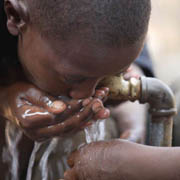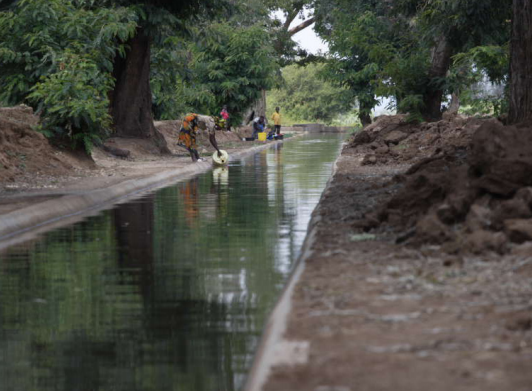Mainstreaming Climate Change in Integrated Water Resources Management in Pangani River Basin


Introduction
The Pangani River Basin drains Mount Kilimanjaro and Mount Meru in northern Tanzania and flows to the Indian Ocean in the township of Pangani in Tanga Region. The River and its Basin are greatly important to Tanzania, in terms of hydro-power production, irrigated agriculture, livestock, fisheries, domestic use, ecological needs, etc, but water demand is rapidly rising while water flows are in decline largely due to changing climatic patterns.
The Pangani Basin Water Board is mainstreaming climate change into Integrated Water Resources Management (IWRM) in the Pangani River Basin, so that it may support the equitable provision of freshwater for the environment and for livelihoods for current and future generations. The initiative, which is supported by UNDP in partnership with the IUCN Eastern Africa Regional Office, is promoting increased understanding of the environmental, economic and social implications of different river flow scenarios under a range of climate change scenarios. This includes establishing a sustainable local system for collecting and analyzing flow assessment information over time. Community participation in climate change adaptation and IWRM has been strengthened through establishment of sub-catchment and basin-level fora and training Water User Associations to integrate community-, district- and regional-level concerns into basin-level planning.
Main Objectives of Project
The objective of the project is to prepare water managers and users for changing climatic conditions (especially reduced flows) through the provision of technical data, planning, and improved allocation, capacity building (conflict management) and awareness-raising. The project focuses on the following three technical areas:
– Understanding current and future climatic vulnerability (in the broadest sense of the term): developing and using information for equitable water allocation in a changing hydrological regime.- Negotiated outcomes to minimize future climatic vulnerability and future climatic risk: Continuing dialogues to sustainable water resources management.- Mainstreaming climate change adaptation in the water sector: national linkages and lessons learned.

Main Messages
Some important principles came from the Pangani River Basin Management Project, including the following: • If the flow regime of a river changes then the river ecosystem will change in response. Positive and/or negative impacts might be felt by people. To manage the change we first need to automatically include ecological and social issues in a structured and agreed way into water-resource management plans so that the future implications can be understood and an acceptable future chosen. • A basin-wide integrated flow assessment should be done at the earliest possible stage of water-resource planning, so that a fair trade-off between development and river protection can be agreed. This should then guide all future water-management decisions for the river. • It is never too early to get started – there is always some knowledge on the river and its people, and flow-assessment approaches do exist that can use this knowledge to provide new kinds of information to stakeholders and decision makers. • Implementation of an agreed desired river state and environmental flow is a long and complex task. Government, scientists, and stakeholders including local subsistence users of the river need to work together as a team to achieve truly sustainable use of the river
Contact Details
UNDP Officer, Savinus Kessyemail: [email protected]
(0) Comments
There is no content